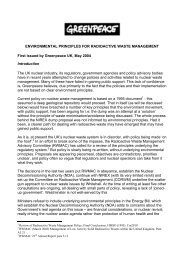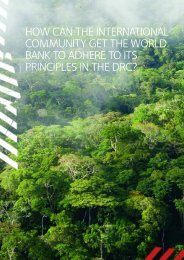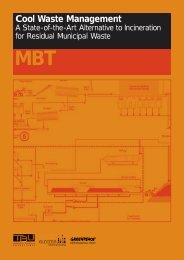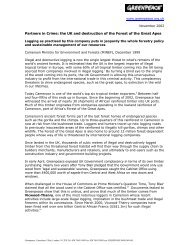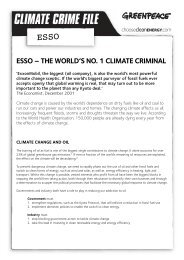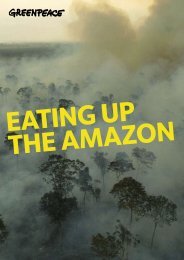The Real Green Revolution - Greenpeace UK
The Real Green Revolution - Greenpeace UK
The Real Green Revolution - Greenpeace UK
Create successful ePaper yourself
Turn your PDF publications into a flip-book with our unique Google optimized e-Paper software.
Foreword<br />
Food security for all the world’s people<br />
Dr Doug Parr, <strong>Green</strong>peace Chief Scientist<br />
<strong>The</strong> crisis in Argentina in late 2001<br />
i l l u s t rated again a frustrating and unjust<br />
reality: there is no direct relationship<br />
b e t ween the amount of food a country<br />
produces and the number of hungry people<br />
who live there. In 2001, Argentina harve s t e d<br />
enough wheat to meet the needs of both<br />
China and India. Yet A r g e n t i n a ’s people we r e<br />
h u n g r y. Argentina's status as the wo r l d ' s<br />
second largest producer of GM crops –<br />
l a r g e ly for export – could do nothing to<br />
s o l ve its very real hunger problems at home.<br />
For fifty years conventional agriculture has<br />
been getting less and less sustainable.<br />
Chemical pesticides, fertilizers and hy b r i d<br />
seeds have destroyed wildlife and crop<br />
d ive r s i t y, poisoned people and ruined the<br />
s o i l . N ow that the organic movement is<br />
taking off in the industrialised wo r l d ,<br />
g ove r n m e n t s , international agencies and<br />
global agribusiness corporations must stop<br />
promoting this destructive system in the<br />
S o u t h . I n s t e a d , there must be coherent and<br />
long-term support – in practice as well as in<br />
principle – to enable the nascent ecological<br />
farming movement in poorer countries to<br />
continue to grow into the future.<br />
<strong>The</strong> world is on the brink of a second ‘Gre e n<br />
<strong>Revolution</strong>’, which – unlike the first – has the<br />
potential to truly live up to its name. This is not<br />
a revolution in biotechnology; still less has it<br />
anything to do with genetic engineering.<br />
Instead, it is a global move towards ecological<br />
a g r i c u l t u re, which promises to both feed a<br />
g rowing world population and to do so<br />
sustainably – without compromising the needs<br />
of future generations to feed themselves.<br />
Working in tandem with nature and<br />
encouraging biodiversity and local self-re l i a n c e ,<br />
this new trend towards organic and<br />
a g roecological farming is vibrant thro u g h<br />
Africa, Latin America and Asia. Although<br />
still largely overlooked by policy-makers, this<br />
movement presents a hopeful alternative to a<br />
world that would be dominated by corporate<br />
a g rochemical giants and monocultural<br />
a g r i c u l t u re. And, as this re p o rt shows, org a n i c<br />
f a rming is not simply a passing fad for<br />
consumers in the rich world. Put into practice<br />
in the South, it can increase food security,<br />
reduce poverty and protect enviro n m e n t a l<br />
re s o u rces for the future – unlike its<br />
conventional alternative.<br />
Organic increasing<br />
This re p o rt identifies some of the positive<br />
t rends currently emerging, for example:<br />
• Latest estimates of land managed accord i n g<br />
to ecological principles vary from 15.8 to 30<br />
million hectares (equivalent to about 3% of<br />
agricultural land in the South).<br />
This figure would almost certainly be much<br />
higher if de facto organic agriculture<br />
practiced by traditional subsistence farm e r s<br />
w e re to be included.<br />
• Two thirds of new members of the<br />
I n t e rnational Federation of Org a n i c<br />
Agricultural Movements (IFOAM)<br />
come from the South.<br />
• I n t e rnational agencies – principally the UN’s<br />
Food and Agriculture Organisation (FA O )<br />
and the Centre for Trade and Development<br />
( U N C TAD) – have woken up to the<br />
potential of organic farming in raising<br />
f a rmers’ incomes, creating jobs and<br />
enhancing food security.<br />
• Cuba has been moving towards a<br />
nationwide organic system, and 65% of its<br />
rice and nearly 50% of fresh vegetables are<br />
now produced org a n i c a l l y. Argentina now<br />
has the largest area of land under org a n i c<br />
cultivation of any country in the world after<br />
A u s t r a l i a .<br />
4


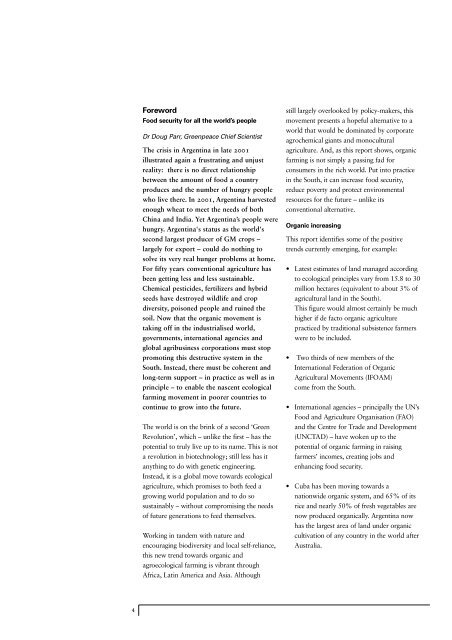

![[2007] EWHC 311 - Greenpeace UK](https://img.yumpu.com/22079793/1/184x260/2007-ewhc-311-greenpeace-uk.jpg?quality=85)

